The dual-cure luting cements market, valued at USD 232.9 million in 2025 and forecasted to reach USD 466.8 million by 2035, reflects a stable CAGR of 7.2%. The initial growth phase from 2025 to 2027 displays moderate expansion, with market size increasing from USD 232.9 million to USD 262.3 million. This phase is shaped by rising adoption of dual-cure cement formulations in restorative and prosthetic dentistry. Clinicians increasingly favor dual-cure systems for their ability to combine chemical and light curing, ensuring optimal adhesion and durability, which drives steady early-stage market expansion. Emerging dental markets contribute incrementally, supported by growing awareness of minimally invasive restorative procedures and investments in dental infrastructure.
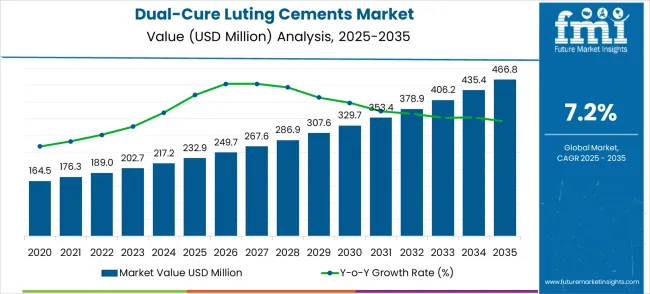
Between 2027 and 2030, the growth curve steepens, moving the market from USD 262.3 million to USD 315.7 million. This period represents the primary acceleration phase, characterized by technology-driven adoption and increasing clinical preference for dual-cure solutions. Enhanced product features, including improved handling properties, faster polymerization, and reduced post-procedural sensitivity, elevate demand among dental professionals. Expansion in the number of dental clinics, coupled with rising procedure volumes for crowns, bridges, and inlays, further intensifies growth, creating a pronounced upward slope in the market trajectory.
| Metric | Value |
|---|---|
| Market Value (2025) | USD 232.9 Million |
| Market Forecast Value (2035) | USD 466.8 Million |
| Market Forecast CAGR | 7.2% |
The subsequent period from 2030 to 2033 shows moderated acceleration, with values increasing from USD 315.7 million to USD 398.1 million. The curve begins to flatten slightly as the market reaches intermediate maturity, reflecting stabilization in adoption rates in established regions. While technological innovation continues to support product differentiation, growth relies more on replacement cycles and incremental clinical adoption in emerging geographies. Competitive pricing strategies and regional distribution improvements maintain steady uptake but temper the overall steepness of the growth curve, indicating a transition toward a linear trajectory.
From 2033 to 2035, the market resumes gradual upward movement, reaching USD 466.8 million. The late-stage growth phase is characterized by sustained demand driven by ongoing dental awareness campaigns, incremental technological refinements, and expanded applications in prosthodontics. The market growth curve, therefore, exhibits an initial moderate slope, followed by a sharp acceleration phase, then partial flattening, and concluding with consistent upward progression. Understanding this curve provides strategic insight for manufacturers and distributors in production planning, marketing focus, and regional expansion priorities within the dual-cure luting cement sector.
The dual-cure luting cements market is entering a phase of accelerated growth, driven by demand for advanced dental materials, restorative dentistry expansion, and evolving clinical and aesthetic standards. By 2035, these pathways together can unlock USD 105-135 million in incremental revenue opportunities beyond baseline growth.
Pathway A -- Hospital Dental Services Leadership (Complex Restorations): The hospital segment already holds the largest share due to its comprehensive dental services and complex procedure requirements. Expanding hospital dental departments, specialized treatments, and clinical excellence initiatives can consolidate leadership. Opportunity pool: USD 35-48 million.
Pathway B -- Self-Adhesive Innovation (Simplified Procedures): Self-adhesive cements account for the largest share due to clinical convenience. Growing dentist focus on workflow efficiency and simplified bonding protocols will drive higher adoption of advanced self-adhesive systems. Opportunity pool: USD 28-38 million.
Pathway C -- Private Dental Practice Growth: Dental clinic markets are expanding rapidly, especially in aesthetic and cosmetic dentistry. Cements optimized for private practice (efficient, reliable, aesthetic) can capture significant growth. Opportunity pool: USD 18-25 million.
Pathway D -- Emerging Market Expansion: Asia-Pacific, Latin America, and Middle East present growing demand due to rising dental healthcare awareness and treatment accessibility. Targeting dental networks and professional education will accelerate adoption. Opportunity pool: USD 12-18 million.
Pathway E -- Digital Dentistry Integration: With advancing CAD/CAM and digital workflow technologies, there is opportunity to develop specialized cements for digital restorations and modern dental manufacturing processes. Opportunity pool: USD 8-12 million.
Pathway F -- Premium & Aesthetic Applications: Cements with enhanced aesthetic properties, improved translucency, and superior color stability offer premium positioning for cosmetic and aesthetic dental procedures. Opportunity pool: USD 6-9 million.
Pathway G -- Implant Dentistry Applications: Growing implant dentistry market creates opportunities for specialized luting cements designed for implant-supported restorations and prosthetic applications. Opportunity pool: USD 4-6 million.
Pathway H -- Professional Education & Training: Advanced training programs, clinical education, and technique workshops create value-added opportunities while building brand loyalty and clinical expertise. Opportunity pool: USD 2-4 million.
Market expansion is being supported by the rapid increase in dental healthcare facility development worldwide and the corresponding need for high-performance cementing materials that provide superior bonding performance and clinical reliability. Modern restorative dentistry relies on consistent cement bonding quality and long-term restoration durability to ensure optimal treatment outcomes including crown and bridge procedures, inlay and onlay restorations, and implant-supported prosthetics. Even minor bonding failures can require comprehensive restoration protocol adjustments to maintain optimal clinical success and patient satisfaction.
The growing complexity of dental restoration requirements and increasing demand for aesthetic and functional dental solutions are driving demand for dual-cure luting cements from certified manufacturers with appropriate dental material capabilities and clinical expertise. Dental practitioners are increasingly requiring documented bonding strength and biocompatibility to maintain restoration quality and treatment longevity. Industry specifications and clinical standards are establishing standardized cementing procedures that require specialized dual-cure technologies and trained dental professionals.
The market is segmented by cement type, application, and region. By cement type, the market is divided into total-etch resin cement, self-etch resin cement, and self-adhesive resin cement. Based on application, the market is categorized into hospital and dental clinic. Regionally, the market is divided into North America, Europe, East Asia, South Asia & Pacific, Latin America, and Middle East & Africa.
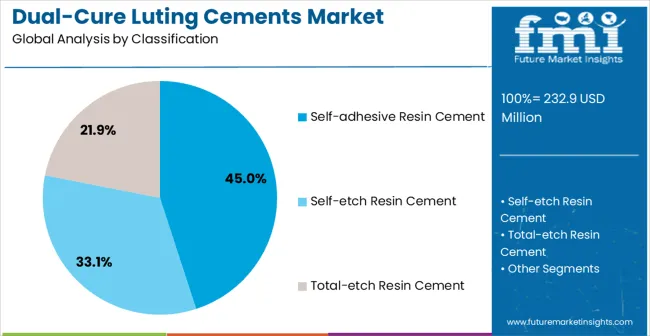
In 2025, the self-adhesive resin cement segment is projected to capture around 45% of the total market share, making it the leading product category. This dominance is largely driven by the widespread adoption of simplified bonding systems that provide optimal clinical convenience and reliable bonding performance, catering to a wide variety of dental restoration applications. The self-adhesive resin cement is particularly favored for its ability to deliver effective bonding with reduced technique sensitivity and simplified clinical procedures, ensuring clinical efficiency.
Hospital dental departments, specialized dental clinics, prosthodontists, and general dentists increasingly prefer self-adhesive systems, as they meet demanding restoration requirements without imposing excessive procedural complexity or time constraints. The availability of well-established clinical protocols, along with comprehensive technical support and evidence-based research from leading dental materials manufacturers, further reinforces the segment's market position. This cement type benefits from consistent demand across regions, as it is considered a versatile solution for dental practitioners requiring reliable and user-friendly cementing systems. The combination of clinical reliability, procedural simplicity, and proven performance makes self-adhesive resin cement a preferred choice, ensuring their continued dominance in the dental cementing materials market.
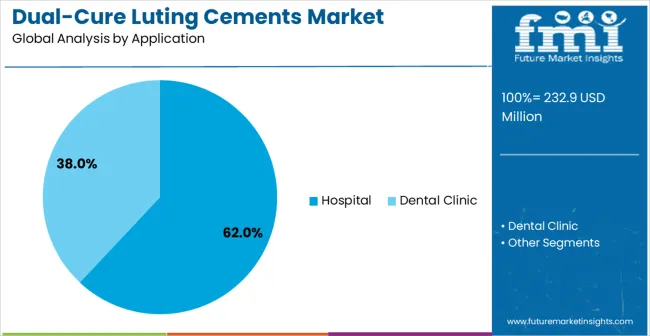
The hospital segment is expected to represent 62% of dual-cure luting cement demand in 2025, highlighting its position as the most significant application sector. This dominance stems from the comprehensive nature of hospital-based dental services and the critical role of advanced cementing materials in complex restorative and prosthetic procedures performed in hospital dental departments. Hospital applications often feature sophisticated dental treatments that require reliable cementing solutions throughout various clinical scenarios and patient populations, requiring high-performance and clinically proven cementing materials.
Dual-cure luting cements are particularly well-suited to hospital environments due to their ability to provide consistent bonding performance and extended working time that accommodates complex procedures, even in challenging clinical conditions. As hospital-based dental services continue to expand globally and dental departments emphasize improved treatment outcomes and clinical efficiency standards, the demand for dual-cure luting cements continues to rise. The segment also benefits from increased investment within the healthcare industry, where hospitals are increasingly prioritizing advanced dental materials and treatment quality as differentiators to provide superior patient care and clinical outcomes.
With hospital dental departments requiring comprehensive restorative capabilities and clinical excellence, dual-cure luting cements provide an essential solution to maintain effective restoration bonding while supporting diverse treatment protocols. The growth of specialized dental services within hospital settings, coupled with increased focus on evidence-based dentistry and clinical outcomes, ensures that hospital applications will remain the largest and most stable demand driver for dual-cure luting cements in the forecast period.
The market is advancing steadily due to increasing dental healthcare development and growing recognition of dual-polymerization technology advantages over conventional light-cure or chemical-cure cements. The market faces challenges including higher material costs compared to traditional cements, need for proper storage and handling procedures, and varying clinical technique requirements across different restoration types. Clinical validation efforts and material technology advancement programs continue to influence product development and market adoption patterns.
The growing development of advanced dual-polymerization systems is enabling superior bonding performance with improved depth of cure and enhanced mechanical properties characteristics. Enhanced polymerization technologies and optimized initiator systems provide reliable cement curing while maintaining optimal working time and handling characteristics. These technologies are particularly valuable for dental practitioners who require consistent bonding performance that can support demanding restoration procedures with reliable clinical results.
Modern dual-cure luting cement manufacturers are incorporating advanced biocompatible features and enhanced material properties that improve clinical performance and patient safety. Integration of advanced fluoride release systems and optimized biocompatibility profiles enables superior clinical outcomes and comprehensive restoration longevity capabilities. Advanced biocompatible features support use in diverse clinical environments while meeting various patient needs and safety specifications.
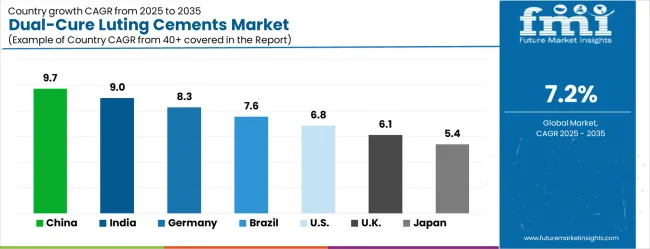
| Country | CAGR (2025–2035) |
|---|---|
| China | 9.7% |
| India | 9.0% |
| Germany | 8.3% |
| Brazil | 7.6% |
| United States | 6.8% |
| United Kingdom | 6.1% |
| Japan | 5.4% |
The global market is anticipated to grow at a CAGR of 7.2% between 2025 and 2035, driven by increasing demand for advanced dental materials and adoption of minimally invasive restorative procedures. China leads with 9.7% growth, supported by expanding dental care infrastructure and rising awareness of aesthetic dentistry. India follows at 9.0%, reflecting growing dental clinics, improved patient access, and adoption of modern cementation techniques. Germany records 8.3%, driven by advanced dental technology adoption and high-quality clinical standards. Brazil is projected at 7.6%, supported by increasing dental treatment demand and modernization of dental practices. The United States grows at 6.8% with focus on innovative restorative materials, while the United Kingdom expands at 6.1%, reflecting steady adoption in dental procedures. Japan shows 5.4%, influenced by gradual market penetration and preference for precision dentistry solutions.
The report covers an in-depth analysis of 40+ countries; top-performing countries are highlighted below.
China is projected to grow at a CAGR of 9.7% between 2025 and 2035, supported by rising adoption of advanced restorative dental procedures and increasing demand for durable cementation solutions. Clinics and hospitals are integrating dual-cure luting cements in crowns, bridges, inlays, and implant procedures. Leading manufacturers such as GC Corporation and 3M have expanded local production and introduced high-strength, bioactive cements tailored for Chinese dental practices. The market is further shaped by the expansion of private dental chains and increasing consumer awareness about restorative dental care. Innovations in adhesive properties, esthetics, and fluoride release have enhanced clinical performance, reinforcing market growth.
India is forecasted to grow at a CAGR of 9.0% from 2025 to 2035, driven by increasing dental clinic networks and rising adoption of cosmetic and restorative dentistry. Demand is concentrated in crowns, bridges, veneers, and implant procedures requiring reliable dual-cure cementation. Companies like Ivoclar Vivadent and Septodont have launched cost-effective and bioactive solutions for Indian dental professionals. Professional training workshops and dental education programs have reinforced adoption. Urban and semi-urban clinics are increasingly upgrading restorative capabilities. Rising awareness of esthetic dentistry and supportive government health initiatives have further contributed to steady market growth.
Germany is expected to grow at a CAGR of 8.3% between 2025 and 2035, supported by high standards of dental care and professional adoption of advanced restorative procedures. Clinics prioritize dual-cure luting cements for their adhesive strength, esthetic properties, and long-term durability. Leading manufacturers such as Ivoclar Vivadent and Heraeus Kulzer have expanded portfolios with bioactive and fluoride-releasing cements. Aging population and increasing preference for long-lasting restorations have driven market penetration. Research collaborations and material innovations further enhance professional adoption. Strong regulatory standards and focus on quality dentistry continue to influence product selection and market expansion.
Brazil is projected to grow at a CAGR of 7.6% from 2025 to 2035, driven by increasing dental clinic infrastructure and rising interest in restorative dentistry. Adoption is concentrated in urban clinics performing crowns, bridges, and implant procedures. Domestic distributors have partnered with global suppliers such as 3M and Dentsply Sirona to provide advanced dual-cure luting solutions. Awareness campaigns on oral health and esthetic dentistry have supported growth. Cost-effective and bioactive cements are preferred for mid-range clinics, while premium products target specialized practices. Government oral health programs also contribute to increasing adoption and market penetration.
The United States is forecasted to grow at a CAGR of 6.8% between 2025 and 2035, influenced by high adoption of cosmetic and restorative dentistry. Clinics prefer dual-cure luting cements for crowns, veneers, inlays, and implants due to their adhesive and esthetic properties. Companies such as 3M, GC Corporation, and Ivoclar Vivadent have expanded product lines with bioactive, fluoride-releasing, and high-strength solutions. Market growth is further supported by dental insurance coverage, continuing education programs, and adoption of advanced restorative protocols. Focus on durability, esthetics, and ease of use drives professional preference and long-term adoption across the USA market.
The United Kingdom is expected to grow at a CAGR of 6.1% from 2025 to 2035, supported by increasing adoption in restorative and cosmetic dental procedures. Dual-cure luting cements are widely used in crowns, bridges, veneers, and implant cementation. Manufacturers such as Dentsply Sirona and GC Corporation have introduced bioactive and adhesive cement solutions tailored to UK dental professionals. Adoption is reinforced through professional training, dental associations, and quality accreditation programs. Public and private clinics are investing in long-lasting and esthetic restorative solutions. Awareness campaigns on oral health and aesthetics have strengthened market demand.
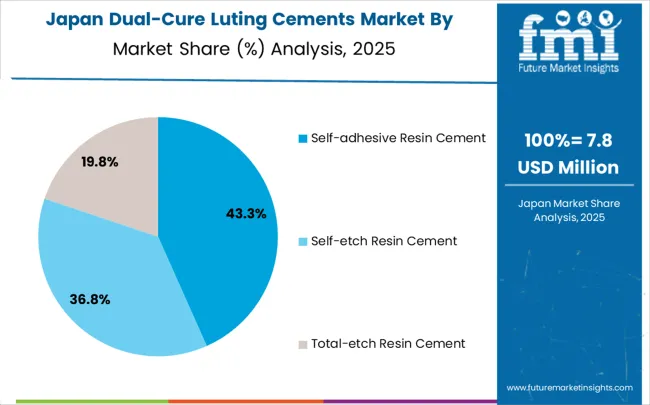
Japan is projected to grow at a CAGR of 5.4% between 2025 and 2035, influenced by high standards of dental care and restorative dentistry adoption. Dual-cure luting cements are used widely in crowns, bridges, inlays, and implant procedures. Domestic and international manufacturers such as Shofu and GC Corporation have introduced bioactive, adhesive, and fluoride-releasing cements for professional use. Clinics prioritize esthetic outcomes, durability, and ease of application. Continuing professional education, product demonstrations, and technological innovation reinforce adoption. Urban clinics in Japan show a preference for high-quality restorative solutions, ensuring consistent market growth throughout the forecast period.
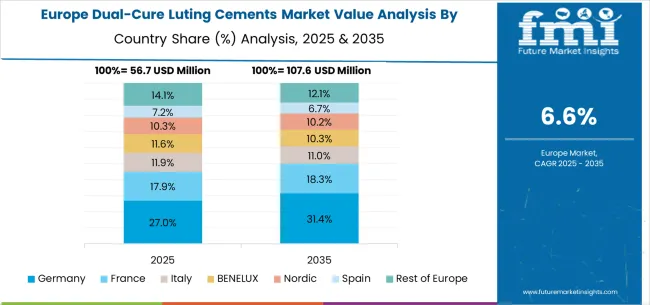
The dual-cure luting cements market in Europe is projected to grow from USD 56.7 million in 2025 to USD 107.6 million by 2035, registering a CAGR of 6.6% over the forecast period. Germany is expected to remain the largest national market with 27.0% share in 2025, rising to 31.4% by 2035, supported by its strong dental infrastructure, advanced materials science systems, and clinical innovation programs. The United Kingdom follows with 17.9% in 2025, edging up to 18.3% by 2035 as restorative dentistry practices and advanced material adoption accelerate. France accounts for 11.9% in 2025, dipping to 10.2% by 2035, reflecting dental industry consolidation and modernization.
Italy holds 11.6% in 2025, moderating to 10.3% by 2035, supported by restorative dentistry centers and steady clinical adoption. Spain represents 10.3% in 2025, easing slightly to 10.2% by 2035, supported by growing demand for restorative dental materials. BENELUX countries contribute 7.2% in 2025, moderating to 6.7% by 2035, while the Nordic region accounts for 14.1% in 2025, dipping to 12.1% by 2035, reflecting stable but mature adoption trends. The rest of Europe (Eastern Europe and other emerging markets) collectively accounts for 9.2% in 2025, rising modestly to 10.8% by 2035, reflecting increasing adoption of advanced dental materials in emerging regional healthcare systems.
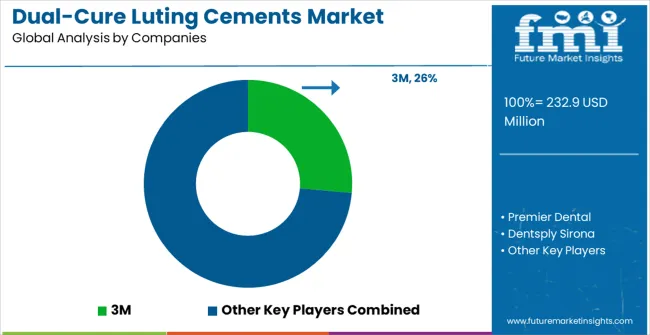
The market is defined by competition among specialized dental materials manufacturers, dental technology companies, and oral healthcare solution providers. Companies are investing in advanced polymerization technology development, bonding performance optimization, clinical application improvements, and comprehensive technical support capabilities to deliver reliable, high-performance, and clinically proven cementing solutions. Strategic partnerships, clinical innovation, and market expansion are central to strengthening product portfolios and dental professional relationships.
3M offers comprehensive dual-cure luting cement solutions with established dental materials expertise and global clinical validation capabilities. Premier Dental provides specialized dental cementing products with focus on clinical performance and practitioner convenience. Dentsply Sirona delivers advanced dental materials solutions with focus on clinical innovation and treatment optimization. Cosmedent specializes in aesthetic dental materials with advanced bonding technology integration.
Kulzer GmbH offers professional-grade dental cementing products with comprehensive clinical support capabilities. Ivoclar Vivadent delivers established dental materials solutions with advanced polymerization technologies. Shofu Inc. provides specialized dental cementing materials with focus on clinical precision optimization. Kuraray, GC International AG, Huge Dental, and DMG offer specialized manufacturing expertise, clinical reliability, and comprehensive product development across global and regional dental materials market segments.
| Items | Values |
|---|---|
| Quantitative Units | USD 232.9 million |
| Cement Type | Total-etch Resin Cement, Self-etch Resin Cement, Self-adhesive Resin Cement |
| Application | Hospital, Dental Clinic |
| Regions Covered | North America, Europe, East Asia, South Asia & Pacific, Latin America, Middle East & Africa |
| Country Covered | China, India, Germany, Brazil, United States, United Kingdom, Japan, and 40+ countries |
| Key Companies Profiled | 3M, Premier Dental, Dentsply Sirona, Cosmedent, Kulzer GmbH, Ivoclar Vivadent, Shofu Inc., Kuraray, GC International AG, Huge Dental, DMG |
| Additional Attributes | Dollar sales by cement type and application segment, regional demand trends, competitive landscape, customer preferences, integration with dental practice workflows, innovations in dual-polymerization and bonding technologies, adoption of biocompatible features for enhanced clinical performance |
The global dual-cure luting cements market is estimated to be valued at USD 232.9 million in 2025.
The market size for the dual-cure luting cements market is projected to reach USD 466.8 million by 2035.
The dual-cure luting cements market is expected to grow at a 7.2% CAGR between 2025 and 2035.
The key product types in dual-cure luting cements market are self-adhesive resin cement, self-etch resin cement and total-etch resin cement.
In terms of application, hospital segment to command 62.0% share in the dual-cure luting cements market in 2025.






Our Research Products

The "Full Research Suite" delivers actionable market intel, deep dives on markets or technologies, so clients act faster, cut risk, and unlock growth.

The Leaderboard benchmarks and ranks top vendors, classifying them as Established Leaders, Leading Challengers, or Disruptors & Challengers.

Locates where complements amplify value and substitutes erode it, forecasting net impact by horizon

We deliver granular, decision-grade intel: market sizing, 5-year forecasts, pricing, adoption, usage, revenue, and operational KPIs—plus competitor tracking, regulation, and value chains—across 60 countries broadly.

Spot the shifts before they hit your P&L. We track inflection points, adoption curves, pricing moves, and ecosystem plays to show where demand is heading, why it is changing, and what to do next across high-growth markets and disruptive tech

Real-time reads of user behavior. We track shifting priorities, perceptions of today’s and next-gen services, and provider experience, then pace how fast tech moves from trial to adoption, blending buyer, consumer, and channel inputs with social signals (#WhySwitch, #UX).

Partner with our analyst team to build a custom report designed around your business priorities. From analysing market trends to assessing competitors or crafting bespoke datasets, we tailor insights to your needs.
Supplier Intelligence
Discovery & Profiling
Capacity & Footprint
Performance & Risk
Compliance & Governance
Commercial Readiness
Who Supplies Whom
Scorecards & Shortlists
Playbooks & Docs
Category Intelligence
Definition & Scope
Demand & Use Cases
Cost Drivers
Market Structure
Supply Chain Map
Trade & Policy
Operating Norms
Deliverables
Buyer Intelligence
Account Basics
Spend & Scope
Procurement Model
Vendor Requirements
Terms & Policies
Entry Strategy
Pain Points & Triggers
Outputs
Pricing Analysis
Benchmarks
Trends
Should-Cost
Indexation
Landed Cost
Commercial Terms
Deliverables
Brand Analysis
Positioning & Value Prop
Share & Presence
Customer Evidence
Go-to-Market
Digital & Reputation
Compliance & Trust
KPIs & Gaps
Outputs
Full Research Suite comprises of:
Market outlook & trends analysis
Interviews & case studies
Strategic recommendations
Vendor profiles & capabilities analysis
5-year forecasts
8 regions and 60+ country-level data splits
Market segment data splits
12 months of continuous data updates
DELIVERED AS:
PDF EXCEL ONLINE
Self-Adhesive Dual-Cure Luting Cement Market Size and Share Forecast Outlook 2025 to 2035
Fluting Paper Market Size and Share Forecast Outlook 2025 to 2035
Breaking Down Market Share in Fluting Paper Industry
Resin Cement for Luting Market Size and Share Forecast Outlook 2025 to 2035
Implantable Drug Eluting Devices Market Size and Share Forecast Outlook 2025 to 2035
Dental Permanent Cements Market Size and Share Forecast Outlook 2025 to 2035

Thank you!
You will receive an email from our Business Development Manager. Please be sure to check your SPAM/JUNK folder too.
Chat With
MaRIA